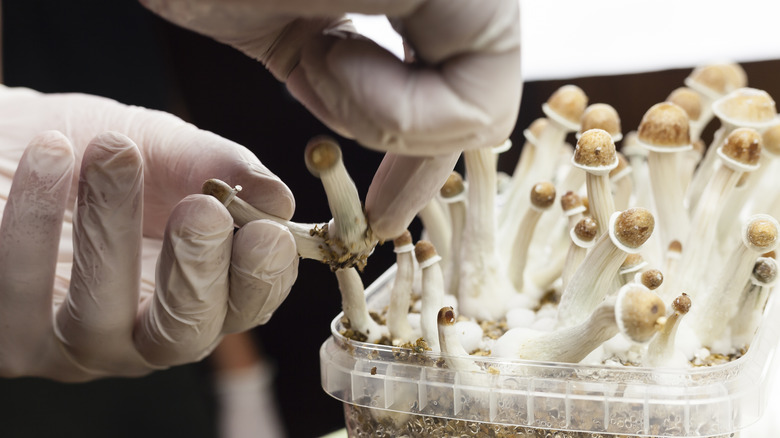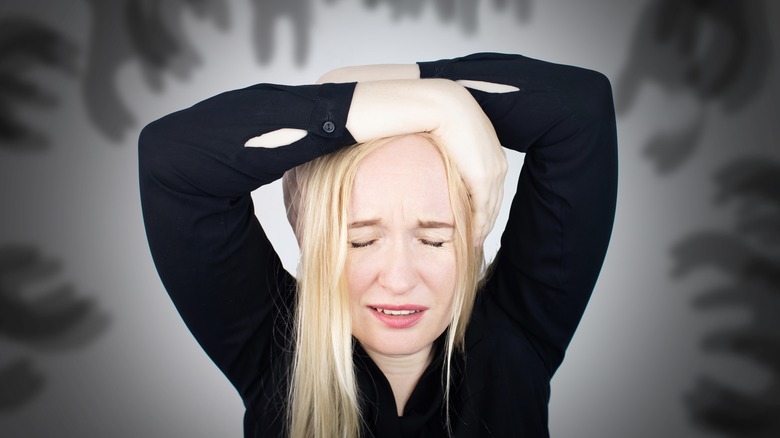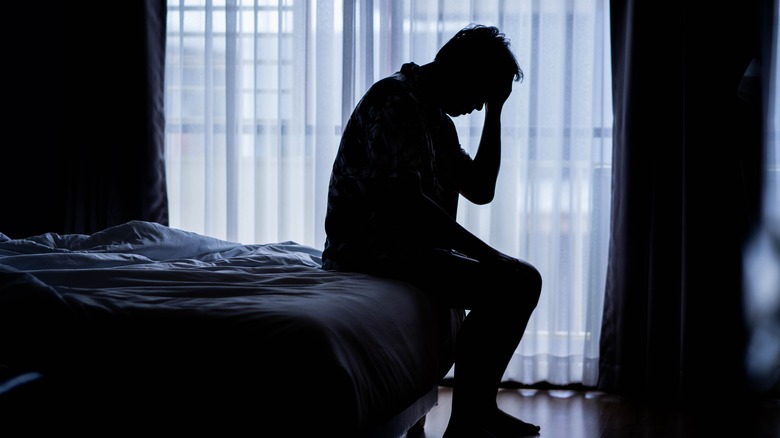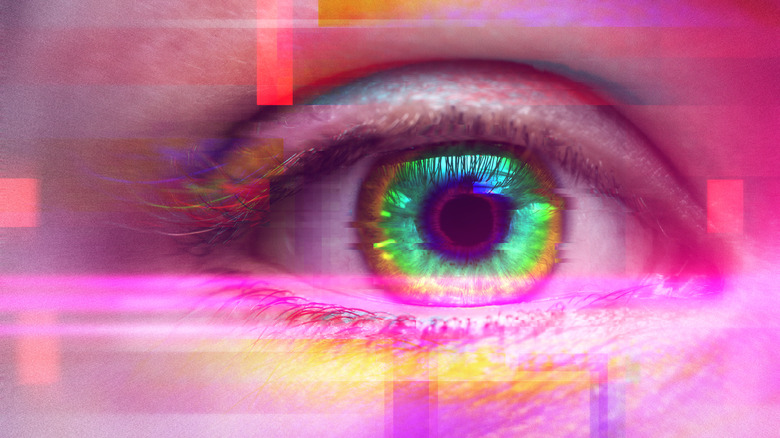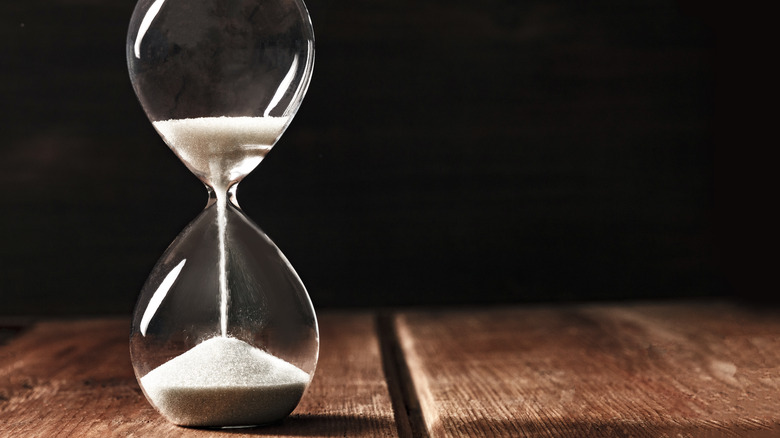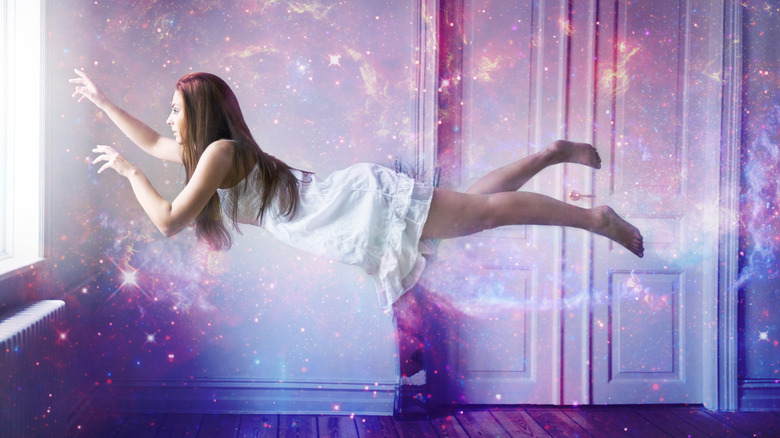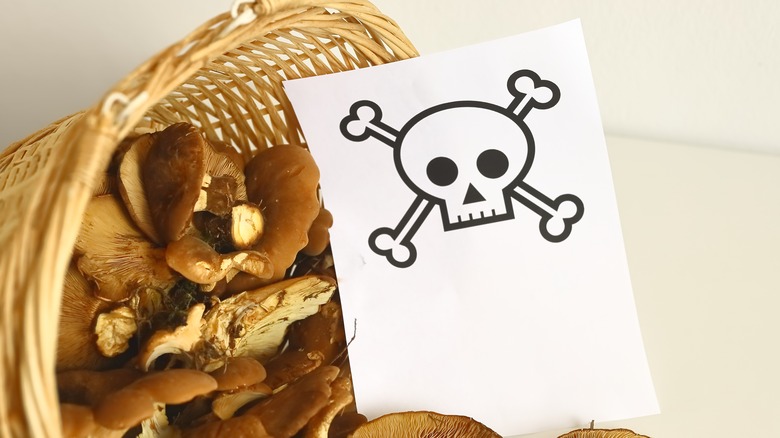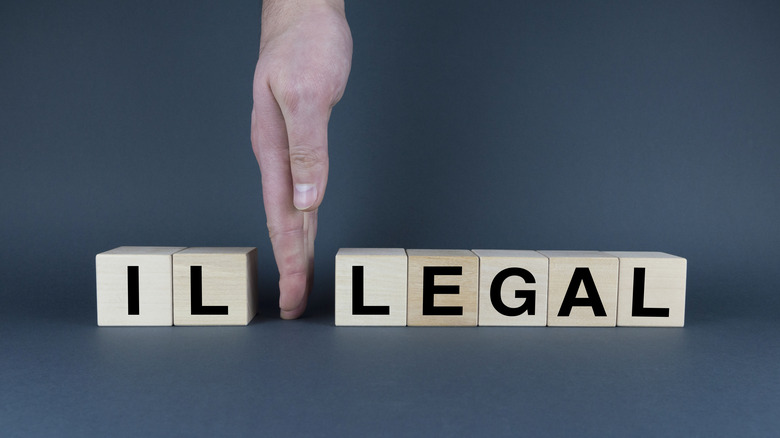Strange Side Effects Of Using Psilocybin Mushrooms
Trigger warning: This article discusses suicide and suicide ideation.
According to a study published in The Journal of Psychopharmacology, psilocybin mushrooms have been valued for centuries in diverse cultural practices and rituals and have recently become synonymous with recreational indulgence, spiritual exploration, self-development, and even therapeutic interventions. The magic in these often-called magic mushrooms happens because of the effects of psilocybin, a psychoactive compound that prompts a cascade of consequences for the human body and mind. In essence, psilocybin binds to 5-HT2A receptors in the brain, causing perceptual alterations or hallucinations commonly known as a "trip." Psilocybin mushrooms can be consumed in various forms, including raw, cooked, dried, or brewed into tea. Once ingested, they can take you on said trip within minutes, and the effects can last for a few hours (via Cambridge University).
Despite their mystical reputation and potent effects, psilocybin mushrooms stand out as a relatively safe substance among psychoactive drugs, with evidence suggesting they have a low addictive potential (per Cambridge University). However, like any drug, you may face ups and downs when embarking on a mushroom journey. On the physical side, you might feel sick, vomit, or have trouble moving. On the mental side, you could hallucinate and experience blurred lines between reality and fantasy. Lastly, high doses have the potential to induce panic attacks or psychotic-like episodes, per the United States Drug Enforcement Administration (DEA). This exploration of psilocybin mushrooms reveals some of the less common side effects that come with their intake, offering a glimpse into the strange and sometimes challenging aspects of these magical fungi.
They are known to cause nausea
Nausea is one of the most frequently reported side effects by those exploring the effects of psilocybin mushrooms, casting a shadow over what is often anticipated as a transformative experience. According to Psychedelic Science Review (PSR), there are various factors that may lead to this unsettling outcome, one of which comes from the intricate biology of the mushrooms themselves. On the one hand, like most mushrooms, psilocybin mushrooms have rigid cell walls primarily composed of chitin (a substance also found in the exoskeletons of insects), which makes them hard to digest and may lead to gastrointestinal (GI) discomfort. While cooking these fungi might seem like a logical solution to enhance digestibility, it poses a paradox, as heat can potentially degrade the shrooms' psychedelic compounds. On the other hand, besides challenging the digestive system, chitin activates immune and inflammatory responses, contributing to the nausea experienced by some users.
Furthermore, the body rapidly transforms psilocybin into its active component, psilocin, during digestion. Some studies suggest that nausea may arise as a side effect of psilocin, adding another layer to the variety of compounds within magic mushrooms. Moreover, the site includes additional factors such as hydration levels, physical condition, individual metabolic differences, and dosage variations as potential culprits of this common side effect. To reduce the risk of nausea when shrooming, be sure to eat a light meal one to two hours before ingesting them, avoid any alcohol intake, and aim to start with a low dose to test your tolerance (via Psychedelic Tips).
They may cause psychological struggles like anxiety, fear, delusions, or paranoia
Taking high doses of psilocybin mushrooms can be a double-edged sword, as it may amplify the risk of negative emotional and psychological outcomes, commonly referred to as having a "bad trip." A study published in the journal Psychopharmacology involving 18 adults who were randomly given varying doses of psilocybin mushrooms, ranging from 5 to 30 milligrams per 70 kilograms of body weight (mg/kg), shed light on the potential psychological challenges. Notably, 39% of participants, particularly those exposed to doses of 20 and 30 mg/70 kg, reported extreme feelings of fear, anxiety about going insane, or a sense of being trapped during their sessions. The intensity of anxiety and fear showed a clear correlation with the dosage, with each increment resulting in significantly higher perceived effects. Also, the timeline of these emotional struggles varied, with some participants experiencing peak anxiety or fear as early as 60 minutes into the session, while for others, it manifested as late as three or four hours.
Moreover, 44% of participants reported delusions or paranoid thoughts during the sessions. For instance, some believed their child or loved ones had died while they were on the trip, while others believed the researchers watching over them were trying to manipulate or harm them on purpose. These findings highlight the potential for high doses of psilocybin to induce a hostile and challenging experience, creating a difficult terrain for those seeking profound psychedelic experiences.
You may experience long-term psychological and emotional effects
Consuming psilocybin mushrooms can unlock a wide range of psychological and emotional experiences that linger long after the trip has ended. In one review published in The Journal of Psychopharmacology involving 1,339 participants, it was found that 24% of those who had a bad trip reported enduring psychological symptoms lasting one week or more after the session. Astonishingly, 10% of participants reported facing prolonged effects, persisting beyond the 12-month mark, and prompting almost 8% of them to seek professional help for symptoms attributed to their psilocybin session. Some of the participants reported diverse lingering effects, ranging from auditory hallucinations (a.k.a. hearing voices) and paranoia to severe depersonalization, disturbing visual hallucinations, extreme confusion, agoraphobia, severe social withdrawal, and mental confusion.
Yet, the enigma deepens as studies also prompt the therapeutic potential of psilocybin. Contrary to the adverse outcomes described above, research suggests that psilocybin may effectively treat conditions such as depression, anxiety, and tobacco use disorder. According to an article published in Nature, psychedelic substances, including psilocybin, seem to actually produce short-term reductions in processing negative emotions while enhancing positive moods. For example, a single high dose of psilocybin may induce sustained effects, diminishing negative and amplifying positive moods. Furthermore, the duration of these reported effects may persist well beyond the elimination of psilocybin from the body. This contradiction highlights the complexity of psilocybin's impact, illustrating that while some may struggle with enduring psychological challenges, others may find relief and therapeutic benefits unlocked by these potent mushrooms.
They may lead to changes in suicidal thoughts or behaviors
When people consume psilocybin mushrooms, it can have either risky or positive effects on their thoughts and actions about suicide, as shown in a duality in outcomes from a review published in The Journal of Psychopharmacology. Per the review, instances of both heightened and diminished suicidality were attributed to both short- and long-lasting effects of what is commonly known as a bad trip. On the one hand, people with pre-existing anxiety, depression, and suicidal planning reported purposeful suicide attempts, while others experienced exacerbated depression that also led to suicide attempts post-psilocybin intake. Conversely, contrasting narratives revealed cases where pre-existing suicidal thoughts, along with depression in some cases, completely declined after the psilocybin encounter.
In a broader context, another study published in The Journal of Psychopharmacology involving 191,832 individuals shed light on the potential protective aspect of psilocybin use. In this case, people who had consumed classic psychedelic substances in the past, including psilocybin, displayed a significantly reduced likelihood of psychological distress, suicidal thinking, planning, and attempts. In fact, the study suggests that using psilocybin throughout your life, without trying other psychedelic drugs, might be particularly helpful in protecting against mental distress and thoughts of suicide, which aligns with data indicating that psilocybin is likely the safest among traditional psychedelic substances. The mix of risks and potential benefits linked to psilocybin mushrooms shows the need to study their effects further and be careful about how these potent mushrooms may affect mental well-being.
If you or someone you know is struggling or in crisis, help is available. Call or text 988 or chat at 988lifeline.org
Some people experience Hallucinogen Persisting Perception Disorder (HPPD)
Most people take psilocybin mushrooms to unlock a spectrum of experiences, but for some, it may lead to a rare and lingering condition known as Hallucinogen Persisting Perception Disorder (HPPD). People who use hallucinogenic drugs may occasionally re-experience the drug's effects through phenomena called flashbacks, which can actually occur days, weeks, or years after consumption (via Healthline). While some may find these flashbacks pleasant, others face perplexing visual disturbances, such as intensified colors, flashes of color, size confusion, halos, lingering outlines, geometric patterns, images within images, difficulty reading, and a general sense of unease, which may affect their everyday activities. Furthermore, people with HPPD often struggle with additional challenges, including anxiety, panic disorders, depersonalization, derealization, and even suicidal thoughts, which, just like the flashbacks, can unfortunately persist for weeks, months, or years.
According to Psychology Today, while there is no cure for HPPD, managing stress, avoiding substance use (aka alcohol and other drugs), and time can contribute to symptom relief. In addition, therapeutic approaches used for conditions like panic disorder and depression may also be beneficial in managing HPPD symptoms.
You may pass out or lose consciousness
Taking psilocybin mushrooms carries the potential for unexpected physiological reactions, and one such is the possibility of losing consciousness, particularly with high doses. According to a study published in The Journal of Psychopharmacology, this phenomenon may be triggered by rapid changes in blood pressure caused either directly by the shrooms or by the intense psychological reactions they provoke. Moreover, dehydration or undernutrition may further exacerbate this risk, creating a delicate scenario that, when disrupted, could lead to passing out. Nevertheless, some participants may have experienced temporary memory loss or simply fallen asleep during their psilocybin experience, which could have mistakenly contributed to the perception of losing consciousness.
Another thing to consider is the possibility that psilocybin might cause irregular heartbeats linked to a prolonged QT interval, which is a measure of the time it takes for the heart muscles to recharge between beats (via StatPearls). While this scenario may theoretically lead to passing out, achieving high doses would be necessary for such cardiac effects to manifest. Still, this potential effect demonstrates the importance of being careful about how much psilocybin mushrooms you take and being aware of how your body might react during the experience.
Seizures are a rare but potential side effect
While seizures are a rare side effect of consuming psilocybin mushrooms, reported cases have raised concerns, especially when these mushrooms interact with medications such as lithium. According to a study published in the Journal of Psychopharmacology, the exact causes of seizures following psilocybin mushroom intake remain unknown. Still, several factors may contribute to this rare occurrence, including pre-existing health conditions, interactions with other substances or medications, and even accidental consumption of poisonous mushrooms. Notably, lithium, a gold-standard treatment for bipolar disorders, has consistently been linked to severe adverse reactions to psychedelics, including seizures.
A study published in Pharmacopsychiatry revealed that the risk of experiencing a seizure significantly increased when people on lithium used classic psychedelics. While the risk was more frequently associated with LSD, it was also observed with psilocybin intake. In addition, another study published in Frontiers in Neurology suggests that the history of epilepsy may make seizures related to classic psychedelics more common. In this case, the risk potential for seizures might be dose-related based on the case of a patient experiencing multiple seizures with a larger dose of psilocybin mushrooms. While the incidence of seizures remains rare, these findings highlight the need for informed decision-making and monitoring when venturing into the world of psilocybin mushrooms.
Psilocybin is known to alter the perception of time and space
Psilocybin mushrooms have long been recognized for their ability to warp the perception of time and space, creating an otherworldly experience for those who ingest them. Per an article published in Frontiers in Psychology, this happens because hallucinogens that act upon the neurotransmitter serotonin, such as psilocybin, generate a subjective sense of time dilation, causing the perceived flow of time to slow down. This alteration in time perception is associated with the activity of the 5-HT2A receptor in the brain, a serotonin receptor involved in the psychedelic effects of psilocybin. Interestingly, the slowing of perceived time is not unique to psilocybin experiences but shares similarities with psychiatric disorders like schizophrenia, where disruptions in time perception are also observed and linked to 5-HT2A receptor activities.
In a study published in The Journal of Psychopharmacology investigating the dose-dependent effects of psilocybin on mental processing, volunteers were tested under different psilocybin doses. The results revealed that when individuals were under the influence of psilocybin, their capacity to accurately estimate or reproduce time intervals longer than 2.5 seconds was negatively affected. They also experienced difficulty coordinating actions to match rhythmic intervals between beats that were longer than 2 seconds, showing how psilocybin really affects the way people think about time.
You may feel uneasily estranged or separated from yourself
Per a review published in The Journal of Psychopharmacology, exploring the effects of psilocybin mushrooms reveals a potential side effect that can be challenging for some individuals: the experience of depersonalization. Depersonalization means feeling disconnected from yourself and what's around you. It's like having an experience where you feel separate from the current moment, akin to an out-of-body experience (via Medical News Today). The severity of depersonalization may vary from one person to another, and it can stem from different conditions, including post-traumatic stress disorder and the use of recreational drugs like hallucinogens, alcohol, cannabis, and ketamine.
Additionally, an article published via Cambridge University explains that those who deal with depersonalization are acutely aware of a troubling shift in their perception of themselves or the world around them. For instance, self-reports mention the unsettling sense of the depersonalization experience, with accounts describing it as feeling 'like a robot,' 'different from everyone else,' or 'separate from myself.' Furthermore, some describe sensations of being 'half-asleep' or having a mind filled with 'cotton wool,' which signals challenges in concentration. Another prevalent theme during an episode of depersonalization involves a decrease or loss of emotional responses, with individuals expressing sentiments of being so detached that they are unable to have any emotions.
There's a high risk of getting mushroom poisoning
Consuming psilocybin mushrooms carries not only the potential for a psychedelic experience but also a significant risk of mushroom poisoning if you mistakenly ingest the wrong type of shrooms (via Cambridge University). According to the NLM, while there are numerous mushroom species, only around 100 of them are toxic, and poisonings mainly occur due to misidentification by foragers who mistake a poisonous species for an edible one. The outcomes of mushroom poisonings can range from mild symptoms of GI discomfort (described as the most common result) to severe manifestations, including liver failure, kidney failure, and neurological issues. Per the site, activated charcoal may offer some benefits against this type of poisoning if administered promptly. Also, taking antiemetics (drugs to prevent vomiting and nausea), making sure you're well hydrated, and correcting electrolyte imbalances may be helpful for managing acute GI symptoms. Fortunately, with proper supportive care, many cases of mushroom ingestion with GI symptoms recover without complications.
Still, regardless of any potentially positive outcomes or what you may hear or think, health professionals warn that there is no reliable "home test" to distinguish between edible and poisonous mushrooms, so if there is any uncertainty about the safety of a mushroom, they strongly advise not to consume it (per Better Health). To minimize the risk of mushroom poisoning, the site recommends only consuming mushrooms purchased from trustworthy sources. Remember that nothing is more important than ensuring your safety and well-being.
Mushroom legislation in the U.S.
In the U.S., the legislative landscape surrounding psilocybin mushrooms is evolving, reflecting changing attitudes toward psychedelic substances. This shift is exemplified by a patchwork of state legislative reforms that aim to make psychedelic drugs more accessible to Americans, as stated by a review published in JAMA Psychiatry. For instance, Denver, Colorado, took the lead in May 2019 by becoming the first city to decriminalize psilocybin. Subsequently, in late 2020, Oregon marked a historic milestone as the first state to both decriminalize and legalize psilocybin for therapeutic use.
Per World Population Review, psilocybin is categorized as a Schedule I drug, characterized by high potential for misuse and no recognized medical use. However, researchers in 2018 proposed reclassifying magic mushrooms as a Schedule IV drug for medical use, suggesting their potential in treating depression, anxiety, and substance use disorders. This means that the legislative momentum for psychedelics overlaps with a surge in scientific and business interests in psychedelics, highlighting the ongoing transformation of attitudes toward psychedelic substances in the U.S. Nevertheless, the future trajectory of psychedelics in the U.S. still hinges on several factors, including ongoing clinical trials' outcomes and FDA decisions, the potential reclassification of psychedelics by the DEA, and continued state-level legislative reform, which is very similar to the trajectory of cannabis legalization.
Besides the actions taken in Oregon and Colorado, states like Connecticut, Maryland, Texas, and Utah are still working on getting medical research approval, while the District of Columbia, Massachusetts, Michigan, and Washington have decriminalized their use in select municipalities. Lastly, laws regarding psilocybin mushrooms are still ongoing legal considerations and potential changes in Georgia, Illinois, Kansas, New York, Pennsylvania, Virginia, and West Virginia, while the remaining states still consider them illegal.
